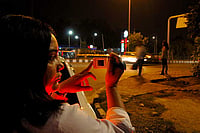Three women—grandmother, mother, daughter—populate Chitra Banerjee Divakaruni’s new book, a novel told in the form of short stories. So we meet Sabitri, the ailing grandmother, in 1995, as she puts pen to paper in her ancestral village, some distance from Calcutta. She is writing to her granddaughter, Tara, who she has never met, about a life-changing decision she is about to make. As she writes, we trace Sabitri’s dramatic rise and fall, from poverty to one of Calcutta’s best sweet-makers, her complicated marriage, the birth of her daughter, Bela, and life spiralling out of control.
Divakaruni shifts gears, and retreats more than three decades to her next story, exploring the story of a young Bela in 1963. The stubborn, reserved, whimsical daughter of a gritty and stoic Sabitri. Bela grows up, flees with her political refugee boyfriend to American shores. Then comes along Tara, her daughter, who grows up with dilemmas of her own—dropping out from college, and not knowing where she belongs. And so we swing from 1963 to 2020, each story picking a different period in the lives of these women, between east India and America. Each thread breaks down the traditional novel to suit the form of short stories. There is room to breathe even while being able to enjoy the narrative as a whole.
Before We Visit the Goddess is more than a story of immigrant angst and displaced identity. There’s magic, drama, breaking and healing through culinary pleasures. This novel is about mothers and daughters and their fragile and often fraught bond. What Divakaruni’s three women don’t find in conventional parental figures, Sabitri, Bela, Tara, seek in others they meet, and some unusual, heartening relationships are formed. In many ways, this brightens the novel that is, largely, an exercise in mourning—for mistakes that shouldn’t have been made, for relationships that destroyed other relationships. The motif of food and its powers is soothing.
The strongest characterisation is that of its oldest heroine, Sabitri. The two younger women are less fleshed out, and far less worthy of empathy. Divakaruni’s dysfunctional women make you wonder about human motivations. Why self-destruct? If only there was a simple answer.


























